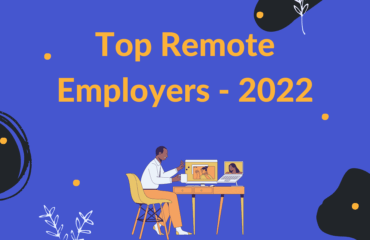Table of Contents
If we look back a couple of years, we would notice that corporate players were dream employers for most candidates. However, with a change in time, startups have not only made a mark commercially, but their fast-paced culture, growth opportunities, and relaxed culture have also grown to become popular among job seekers. Many professionals, irrespective of their experience, prefer working in a start-up rather than working for a big brand. Freshers and early-career professionals are tempted by the idea of working on multiple tasks and gaining maximum exposure in every domain, while mid-career and experienced professionals look forward to working on new and unique projects from scratch.
In this article, we will talk about some common characteristics of start-up employers. So, if you haven’t ever worked in a start-up and are intrigued by its functioning, this may be the right place for you to make a decision. But before that, let’s have a look at some start-ups that have done well for themselves in a short period of time.
- Clubhouse– This audio app is a social community of people from all around the globe, giving them a platform to talk, listen, and learn from each other. It was launched last year in 2020 and rose to fame quickly. Its popularity led other social platforms like Facebook, Twitter, and Spotify to launch their own audio products.
- Therabody– This is an LA-based tech wellness start-up that is empowering people to live healthier lives through wellness education. The company was established in 2016 and currently employs about 500 people. It was even ranked as one of the fastest-growing companies in the US in 2021 by Deloitte Technology Fast 500™.
- SpringHill Company– It is a video production company founded in 2020 in LA. SpringHill combines three SpringHill companies which include an entertainment production company, a marketing agency, and a brand consultancy. Together, they create culturally-inspired brands and products.
Characteristics of a Start-up Employer
1) Dynamic environment
‘Ability to work in a dynamic environment’ is a common statement that you will find in almost all job descriptions posted by a start-up employer. Start-ups are known for their fast-paced environment. You can expect things to be moving quickly without having to involve a lot of bureaucracy and hierarchy. This also includes the execution of multiple tasks at a time. For example, if you are hired as a marketing executive, there may be times when you will have to work on general administration tasks. This is one of the reasons why start-up employers desire the previous experience of working in a start-up or a fast-paced environment. The employees are expected to be multi-taskers, quick learners, solution-oriented, and self-starters.
Start-ups regularly experience a change in their work and organization. Hence, employees are expected to be able to deal with the constant changes taking place in their workplace. This means having to work more hours or in different domains that may lie outside your area of expertise. As a result, a start-up environment may not align with the interests of professionals looking to work in a conventional work setting.
2) High growth
Career growth is crucial and is said to be a key factor contributing to employee happiness. In fact, it is one of the important reasons professionals choose a start-up over an already established, popular brand. According to a study, 30% more start-up employees were happier in their current positions in comparison to FAANG and Microsoft employees.
As a start-up employee, you can expect to grow at a higher pace than you would in a corporate setting. This could typically mean moving higher in the hierarchy quicker, acquiring titles, enhanced scope of your role, and better remuneration. Moreover, you develop more skills and gain more knowledge working in different roles. This helps you grow not only professionally but also personally.
3) Working flexibly
With the rapidly changing ways of working, people are looking to move out of the 9-5 routine and opt for a more flexible way of working. With this in mind, many big corporate houses have introduced remote or hybrid working. However, in many cases, this still involves working from the office or following a 9-5 routine. When it comes to flexible working, start-ups are known to have an upper hand. Most start-up employers do not look for a typical 9-5 routine. In fact, with the new changes, they have started offering multiple options like:
- Permanent work from home
- 3/4-days remote work
- Not following a typical, fixed-hour routine
4) Relaxed culture
Fun, collaborative, informal, and entrepreneurial are some common words that could aptly describe a start-up culture. Start-up culture is usually characterized by a flat hierarchy that supports no or few levels of middle management and staff. This means that in most cases, an employee reports directly to the higher level of management i.e. the founder/CEO. The start-up environment could also be termed as ‘chill’ when it comes to interactions and group activities. ‘Learning by Doing’ is another factor that forms an essential part of the start-up culture. In big corporate houses, employees usually go through well-developed training programs. However, this is not the case with start-ups. While you may have some guidance on how things work, you are required to work on most things yourself. This involves a lot of research, learning through different sources, executing, failing, re-learning, and executing again.
If you are a no-nonsense person, workplace politics can annoy you to the core. This is where being in a start-up can help you. Start-ups are usually known for their ‘no politics’ attribute. This is mostly due to the smaller size of the team and a flat hierarchy. Furthermore, with corporate employers, your contribution and effort are limited to your job role. While this has a snowball effect on the overall success of the organization, it works a little differently for start-ups. Working in a start-up naturally develops your commercial mindset. This means you are focused on making an actual impact on your organization financially. You are concerned about what may or may not work for the organization and work towards enhancing it. Your goals and the organizational goals are the same.
5) Compensation
The compensation structure in a start-up is dynamic and ever-evolving. This may be different from what candidates would often receive in a corporate setting. Corporate employers are known to offer great compensation and benefits. When an employee joins a start-up company, they may be offered equity and strong salaries based on experience. Additionally, in many cases, employees are likely to benefit when the company starts to grow financially. This offsets the potential lack of other benefits.
Someone joining a start-up at an initial stage in their career may only earn average salaries. Nevertheless, a start-up environment provides many opportunities to grow in the role. This means timely promotions with an increase in salaries. On the other hand, experienced professionals are likely to receive strong compensation based on their expertise and skills.
Top skills required by start-up employers
In this section, we will have a look at some key skills that can give you a competitive advantage against other candidates.
1) Hard Skills
Hard skills are often decided based on the job requirements. If you are applying for a job in the tech industry, you may be required to know about Artificial Intelligence, CyberSecurity, UI/UX Design, Data Analytics, and more. However, some common technical skills that may be required irrespective of the job are:
a) Digital Marketing
Once the business operations take off, the next step is to familiarize the world with your brand. Thus, social media management and content marketing are popular in today’s job market. Using the internet to market your product and services for enhanced sales is one of the cheapest forms of marketing. Some specific aspects that can be helpful are Search Engine Optimization (SEO), Email Marketing, Search Engine Marketing (SEM), and Copywriting.
b) Project Management
Project Management is the application of methods, knowledge, and skills to achieve a project’s goals. It requires management of the team, schedule, budget, and resources. Start-up employers look for project management skills in candidates as they usually don’t have a budget to train someone in project management. They would rather employ someone with experience to support their team and operations.
c) Data Analysis
The new world of work is defined by data. The ability to collect, analyze, and interpret data and make decisions based on it is unique. According to a study, only about 25% of candidates feel confident in their data skills. Thus, if you are a data wizard, it can greatly benefit your application with your employer of choice.
d) MS-Excel
Most employers look for MS-Suite as a desired skill on your resume. However, the ability to proficiently work solely on MS-Excel or Spreadsheets can take you a long way. Excel makes it easier for businesses to store and analyze data. This is especially true for start-ups that can not afford to spend resources on fancy tools for data storage and analysis.
2) Soft Skills
Soft skills are usually common in all jobs. These demonstrate your ability to work and maintain relationships in your workplace. Let’s have a look at some common soft skills desired by start-up employers below.
a) Commercial mindset
As mentioned earlier, a commercial mindset can be helpful when working with a start-up. It allows you to look at things objectively and make decisions practically. In interviews, also demonstrates a deep understanding of your role, industry, commercial models and strategies, and your products and services. To develop this, we suggest reading about your industry trends from reliable sources and listening to industry experts.
b) Effective oral and written communications
Communication skills are important irrespective of the size of the company. When working with a start-up, there would be a higher need to communicate with external stakeholders. Thus, effective oral and written communications are a necessity. If you believe, there is a need to improve your communication skills, we suggest finding opportunities to practice more. This would include talking to peers and colleagues, participating in discussions and debates, and using tools like Grammarly to focus on your written communication.
c) Resilience and confidence
Every job requires resilience and confidence. It is even more important as a start-up employee because you will be setting a foundation for many processes. Processes, that may fail multiple times before finally reaping results. So, as someone working on new things for the first time, resilience and confidence is a must. It will get your foot in the doors.
d) Solutions-oriented approach and growth mindset
While working in a start-up, you will not always have the resources to outsource functions. So, all of it would fall into the hands of the current team. You will come across problems you hadn’t worked on before and would require you to change strategy multiple times. This is where a growth mindset and a solutions-oriented approach work in your favor.
e) Strong decision-making and critical thinking skills
Being short on resources, you may have only one shot at a lot of things. These skills will allow you to examine the situation properly, analyze it, and make informed decisions accordingly. Critical thinking and decision-making skills take years to build up. Thus, start-up employers look for candidates already proficient in these skills. For your interview, we strongly suggest preparing examples that demonstrate your proficiency.
Whether you are starting your career or looking for your next job, a start-up environment can be a great place for you to explore and learn. The abovementioned characteristics are common among all start-ups irrespective of their industry and location. If they align with your interests and ways of working, it can be a good move for your career. We suggest identifying some start-ups in your target industry and exploring their careers section. If you need any help, we would be happy to speak with you and help you make a decision.








